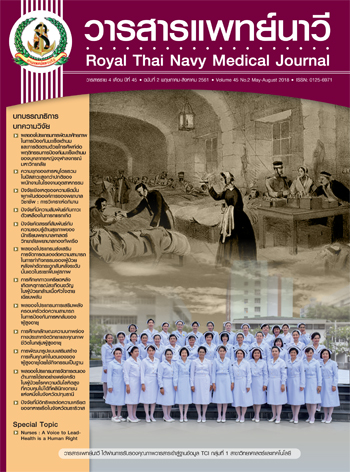ปัจจัยเชิงเหตุของความยึดมั่นผูกพันต่อองค์การของพยาบาลวิชาชีพ : การวิเคราะห์อภิมาน
Main Article Content
บทคัดย่อ
การวิเคราะห์อภิมานงานวิจัยครั้งนี้มีวัตถุประสงค์เพือ 1) อธิบายคุณลักษณะของงานวิจัยที่ศึกษาปัจจัยเชิงเหตุของความยึดมั่นผูกพันต่อองค์การของพยาบาลวิชาชีพ 2) ศึกษาปัจจัยและวิเคราะห์ค่าเฉลี่ยดัชนีมาตรฐานสัมประสิทธ์สหสัมพันธ์ของปัจจัยเชิงเหตุของความยึดมั่นผูกพันต่อองค์การของพยาบาลวิชาชีพ กลุ่มตัวอย่างที่ใช้ในการวิจัย ได้แก่ ปริญญานิพนธ์ในระดับบัณฑิตศึกษา ที่ศึกษาเกี่ยวกับปัจจัยเชิงเหตุของความยึดมั่นผูกพันต่อองค์การของพยาบาลวิชาชีพในประเทศไทย ตั้งแต่ปี พ.ศ. 2538 – 2558 จำานวน 45 เรือง คัดเลือกกลุ่มตัวอย่างแบบเฉพาะเจาะจง เครืองมือในการเก็บข้อมูล ได้แก่ แบบบันทึกงานวิจัยประกอบด้วย แบบคัดเลือกงานวิจัย แบบประเมินคุณภาพงานวิจัย และแบบบันทึกคุณลักษณะและผลการวิจัยผ่านการตรวจสอบคุณภาพความตรงตามเนื้อหาจากผู้ทรงคุณวุฒิ จำานวน 5 คน วิเคราะห์ข้อมูลด้วยวิธีการของ Glass, McGaw, Smith
ผลการวิจัย พบว่า 1) คุณลักษณะของงานวิจัย ประกอบด้วย 3 ด้าน ได้แก่ ด้านลักษณะทั่วไป ด้านเนื้อหาสาระของงานวิจัย และด้านวิธีวิทยาการวิจัยและคะแนนคุณภาพงานวิจัย 2) ปัจจัยเชิงเหตุของความยึดมั่นผูกพันต่อองค์การของพยาบาลวิชาชีพ ประกอบด้วย 4 ด้าน ได้แก่ ด้านองค์การ (r = .405) ด้านผู้นำา (r = .398) ด้านลักษณะงาน (r = .375) และด้านปัจจัยส่วนบุคคล (r = .187) ตามลำาดับ
ข้อเสนอแนะที่ได้จากการวิจัย คือ ปัจจัยเชิงเหตุที่มีระดับความสัมพันธ์กับความยึดมั่นผูกพันต่อองค์การของพยาบาลวิชาชีพสูงที่สุด คือ ปัจจัยด้านองค์การ รองลงมา คือ ปัจจัยด้านผู้นำา ดังนั้น ผู้บริหารควรให้ความสำาคัญกับการปรับปรุงพัฒนาปัจจัยด้านองค์การและปัจจัยด้านผู้นำา เพือส่งเสริมให้พยาบาลวิชาชีพเกิดความยึดมั่นผูกพันต่อองค์การ
Article Details

อนุญาตภายใต้เงื่อนไข Creative Commons Attribution-NonCommercial-NoDerivatives 4.0 International License.
เอกสารอ้างอิง
2. Meyer JP, Allen NI, Smith CA. Commitment to organization and occupations: extension and test of a three-component conceptualization. J Appl Psychol 1993;78(4):538-51
3. Sukchuay K. Organizational commitment of engineers, Provincial Electricity Authority. [Master’s Thesis, Faculty of Social Administration]. Thammasat University; 2011. (in Thai)
4. อัญชลี สินธุวรรณะ. ความสัมพันธ์ระหว่างปัจจัยส่วนบุคคล บรรยากาศจริยธรรมในงานกับความยึดมั่นผูกพันต่อองค์การของพยาบาลวิชาชีพ โรงพยาบาลสังกัดกระทรวงกลาโหม. [วิทยานิพนธ์พยาบาลศาสตรมหาบัณฑิต แขนงวิชาการบริหารการพยาบาล]. มหาวิทยาลัยสุโขทัยธรรมาธิราช; 2550
5. Chaitup M. The relationships between organizational crimate and organizational commitment of register nurses in sub-distric health promoting hospitals, Mahasarakham province. [Master’s Thesis, Faculty of Public Health]. Khon Kaen University; 2012. (in Thai)
6. Suttharat S. Relationships between work environment, leadership of head nurses, and organizational commitment of generation Y professional nurses, autonomous university hospitals. [Master’s Thesis, Faculty of Nursing]. Chulalongkorn University; 2013. (in Thai)
7. ศกลรัตน์ ต๊ะวิชัย. ปัจจัยคัดสรรที่เกี่ยวข้องกับความยึดมั่นผูกพันต่อองค์การของพยาบาลวิชาชีพ โรงพยาบาลลำปาง. [วิทยานิพนธ์พยาบาลศาสตรมหาบัณฑิต สาขาวิชาการบริหารการพยาบาล].มหาวิทยาลัยเชียงใหม่; 2544
8. เสาวนี สุทธิวารี. ความยึดมั่นผูกพันต่อองค์การของพยาบาลวิชาชีพ โรงพยาบาลตราด.[วิทยานิพนธ์พยาบาลศาสตรมหาบัณฑิต สาขาวิชาการบริหารการพยาบาล]. มหาวิทยาลัยบูรพา; 2549
9. Prada J. Relationships between personal factors, constructive organizational culture, organizational readiness, and organizational commitment as perceived by professional nurses, psychiatric hospitals. [Master’s Thesis, Faculty of Nursing]. Chulalongkorn University; 2002. (in Thai)
10. Glass GV, McGaw B, Smith ML. Meta-analysis in social research. Beverly Hills: CA Sage; 1987
11. Kongyoo S. A meta-analysis on antecedent variables of nurses’ quality of working life. [Master’s Thesis, Faculty of Nursing]. Chulalongkorn University; 2014. (in Thai)
12. Burn N, Grove SK. Understanding nursing research: building an evidence-based practice. 5th ed. St. Louis: MO: Saunders/Elsevier; 2011
13. นงลักษณ์ วิรัชชัย. รายงานการสังเคราะห์งานวิจัยเกี่ยวกับคุณภาพการศึกษาไทย: การวิเคราะห์อภิมาน. กรุงเทพมหานคร: โรงพิมพ์แห่งจุฬาลงกรณ์มหาวิทยาลัย; 2552
14. Cooper H, Hedges LV. The handbook of research synthesis. New York: Russel Sage Foundation; 1994
15. Sathanee J. A meta-analysis of consequence variables of job empowerment of professional nurses. [Master’s Thesis, Faculty of Nursing]. Chulalongkorn University; 2008. (in Thai)
16. Langprasert S. Meta-analysis research of innovations to improve reading comprehensions of elementary school students. [Master’s Thesis, Faculty of Education]. Chulalongkorn University; 2007. (in Thai)
17. Khunchana W. Meta-analysis of research on student’s problem solving skills. [Master’s Thesis, Faculty of Education]. Chulalongkorn University; 2007. (in Thai)
18. กระทรวงศึกษาธิการ. ประกาศกระทรวงศึกษาธิการ เรื่องเกณฑ์มาตรฐานหลักสูตรระดับบัณฑิตศึกษา พ.ศ. 2548. กรุงเทพมหานคร: ราชกิจจานุเบกษา: เล่มที่ 122 ตอนพิเศษ 39 ง; หน้า 14-5
19. อุไรพร จันทะอุ่มเม้า. คุณภาพชีวิตในการทำงานของวิชาชีพพยาบาล. วารสารกองการพยาบาล 2555;39(1):92-6
20. วิจิตร ศรีสุพรรณ, กฤษดา แสวงดี. ข้อเสนอเชิงนโยบายในการแก้ปัญหาการขาดแคลนพยาบาลวิชาชีพในประเทศไทย. วารสารสภาการพยาบาล 2555;27(1):5-12
21. สภาการพยาบาล. แผนพัฒนาการพยาบาลและการผดุงครรภ์แห่งชาติ ฉบับที่ 3 (พ.ศ. 2555-2559). นนทบุรี: สภาการพยาบาล; 2555
22. Sawaengdee K. The current nursing workforce situation in Thailand. Journal of Health Systems Research 2008;2(3):40-6. (in Thai)
23. บุญใจ ศรีสถิตย์นรากูร. ภาวะผู้นำและกลยุทธ์การจัดการองค์การพยาบาลในศตวรรษที่ 21. กรุงเทพมหานคร: โรงพิมพ์แห่งจุฬาลงกรณ์มหาวิทยาลัย; 2550
24. รัมภาพรรณ ประมวลทรัพย์. ความสัมพันธ์ระหว่างปัจจัยส่วนบุคคล ความไว้วางใจหัวหน้าหอผู้ป่วย ความพึงพอใจในงานกับความยึดมั่นผูกพันต่อองค์การของพยาบาลประจำาการ โรงพยาบาลศูนย์.[วิทยานิพนธ์พยาบาลศาสตรมหาบัณฑิต สาขาวิชาการบริหารการพยาบาล]. จุฬาลงกรณ์มหาวิทยาลัย; 2549
25. Sheldon ME. Investment and involvement as mechanism producing commitment to the organization. Administrative Science Quarterly 1971;16:143-50
26. สำราญ บุญรักษา. ความพึงพอใจในงานและความยึดมั่นผูกพันต่อองค์การของพยาบาลวิชาชีพ
สังกัดกรมสุขภาพจิต. [วิทยานิพนธ์พยาบาลศาสตรมหาบัณฑิต สาขาวิชาการบริหารการพยาบาล].
มหาวิทยาลัยเชียงใหม่; 2539
27. Khunthar A. The impacts and solutions to nursing workforce shortage in Thailand. J Nurs Sci 2014;32(1):81-90. (in Thai)
28. บุญใจ ศรีสถิตย์นรากูร. ระเบียบวิธีวิจัยทางการพยาบาลศาสตร์. กรุงเทพมหานคร: ยูแอนไอ อินเตอร์มีเดีย; 2547
29. วิจิตร ศรีสุพรรณ. การวิจัยทางการพยาบาล: หลักการและแนวทางปฏิบัติ. พิมพ์ครั้งที่ 2. เชียงใหม่: โรงพิมพ์โครงการตำรา คณะพยาบาลศาสตร์มหาวิทยาลัยเชียงใหม่; 2545
30. สมจิต หนุเจริญกุล. การส่งเสริมสุขภาพ: แนวคิด ทฤษฎีและการปฏิบัติการพยาบาล. นครศรีธรรมราช: มหาวิทยาลัยวลัยลักษณ์; 2543
31. วัชรา มณีกาศ. สัมพันธภาพระหว่างบุคคลและความยึดมั่นผูกพันต่อองค์การของพยาบาลวิชาชีพ โรงพยาบาลสมเด็จพระยุพราช. [วิทยานิพนธ์พยาบาลศาสตรมหาบัณฑิต สาขาวิชาการบริหารการพยาบาล]. มหาวิทยาลัยเชียงใหม่; 2543
32. Kunta-In P. Empowerment, organization climate and organizational commitment of professional nurses in community hospitals northern region. [Master’s Thesis, Faculty of Nursing]. Naresuan University; 2006. (in Thai)
33. Chumchuem P. A meta-analysis of factors related to nurses’ job satisfaction. [Master’s Thesis, Faculty of Nursing]. Chulalongkorn University; 2004. (in Thai)
34. McClure ML, Poulin Sovie MD, Wandelt MA. Magnet hospital attraction and retention of professional nurses. Kansas City MO: American Nursing Association; 1983
35. Thancharoen S. Relationships between hospital status, magnet hospital, and organizational commitment of professional nurses, university hospitals. [Master’s Thesis, Faculty of Nursing]. Chulalongkorn University; 2011. (in Thai)
36. Trakoonchaisri M. The relationship between head nurses’ exemplary leadership and organizational commitment of staff nurses at hospital in the central region. [Master’s Thesis, School of Nursing]. Sukhothai Thammathirat Open University; 2007. (in Thai)
37. Blegen MA. Nurses job satisfaction: a meta-analysis of related variables. Nursing Research 1993;42:36-41

